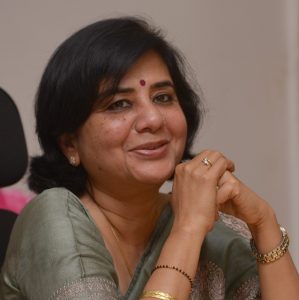An interview about “Ascendance” in The Hindu newspaper, a major daily paper in India….
https://www.thehindu.com/books/books-authors/love-in-the-time-of-cloning/article23912071.ece
Love in the time of cloning
FUTURISTIC VIEW Sadha Shanker at Le Meridien’s The One restaurant | Photo Credit: Special arrangement
Over a generous spread of chicken quesadillas, author-bureaucrat Sadhna Shanker opens up on her literary quest for a world where reproduction is passé
The evening is young. As we enter Le Meridien’s ever popular The One restaurant, the sun seems to have moved well away from its glass wall on the far side. The choicest seats overlooking the inviting expanse of greens are taken. We are with noted author-by-weekend and bureaucrat on week days Sadhna Shanker whose career is on an upward swing. Fittingly her new novel is called “Ascendance”. Published by Rupa, it is all set for a launch this Friday. That is a bit later.
For the moment we take the central table at The One and order cold coffee without ice to begin with. Within a couple of minutes though we realise we have neighbours to our right and left. Some right in front of us too. So we give up our experimentation with the centre and opt for a right wing seat. The food counter is close by, the neighbours just a little removed, and Sadhna is in her element! Cheerful and fresh despite a long day at work, she is brimming over with enthusiasm when talking of “Ascendance”, a work of literary science fiction, and in its own way, a brave voice of experimentation in the days of Chetan Bhagat and Amish Tripathi.
Experimental work
“My target reader is 18 and up to infinity. I am myself not a science student but this story was in my head for sometime. I did a lot of research for it. I have dealt with immortality here, and talk of a world where man and woman do not need each other for reproduction. It is a futuristic saga set in 23rd Century. I would agree it is an experimental work. But if there can be a readership for Amish Tripathi who writes of things rooted in the past, there can be readers for science fiction too,” she says, her confidence not a bit impeded by a market that often tends to go with the flow.
Cold coffee seeks attention. Sadhna obliges, preferring it without ice. She claims to be a food lover, “Give me food. Any food. I love non-vegetarian stuff. When I go out I love to experiment. But I cannot cook. In fact, I am a bad cook. So somebody has to give me food. I relish it. I am not one of those overly calorie conscious.”
Well, soon enough on the table arrive fish and chips and chicken quesadillas. Sadhna takes a little helping of quesadillas leaving me with fish and chips. We exchange our dishes for bit. She likes fish, topping it with tangy sauce but today she would rather talk of her book.
“It is a different book. Science fiction is a rarity in our country. The book can work two ways. It will have a niche readership, or maybe it could catch the fancy of more people and go on to a wider readership. Which is what one would like to see as I have done the book in a simple language. I have talked of immortality or real long life extension. I have not tackled immortality at a spiritual level.” But, surprisingly, it all started on a gender aspect. Umm. But is it not often the case when a woman picks up the pen? “No, it is not like a gender-gender discourse. I have talked of gender neutral relations where women are not needed for reproduction. The reproductive link between man and woman is over. We are moving towards cloning where child rearing could be outsourced.”
How ethical is cloning in a land where we are told through literature that a woman remains incomplete till she becomes a mother?
“Well, we have to change our mindset. I have written about a time when progress of technology will leave our concepts of ethics behind. What is today is not the only reality.”
So where does one find love there? “Well, here a woman discovers a man and talks of how women and men lived. Women know about men though men don’t. Even now, in our times, humanity does not understand the meaning of love. So it is not that far fetched an idea.”
With such angularities, how big a risk is “Ascendance”? “It is a risk, but I would hope it falls on the other side. And it travels well and gets picked up by readers.”
This book done, Sadhna would like to write another, and maybe at some stage consider a writing career. That will have to wait a few years. For the moment the conversation drifts towards changing times and how our society is getting segmented into clusters of ‘we’ and ‘they’. Things look far from bright. And as we look out of the tall glass panes the day has long since died. It is quite dark. We step out. Sadhna leads the way. Life is ascendant.

